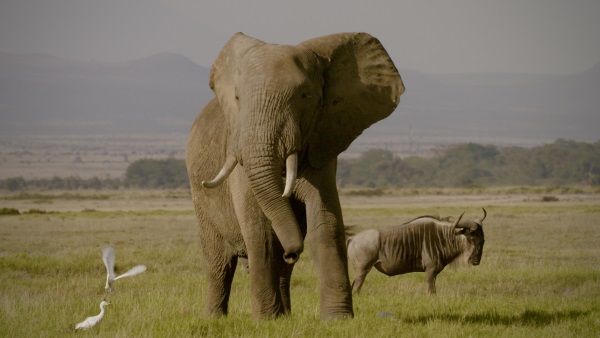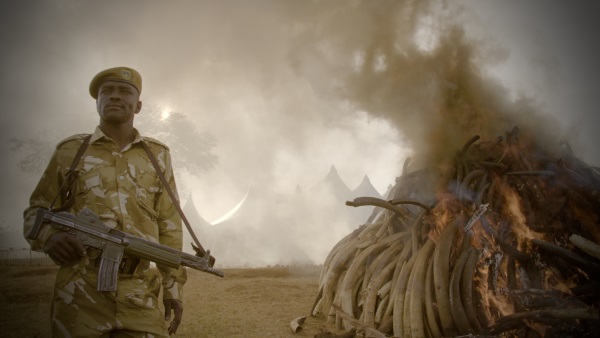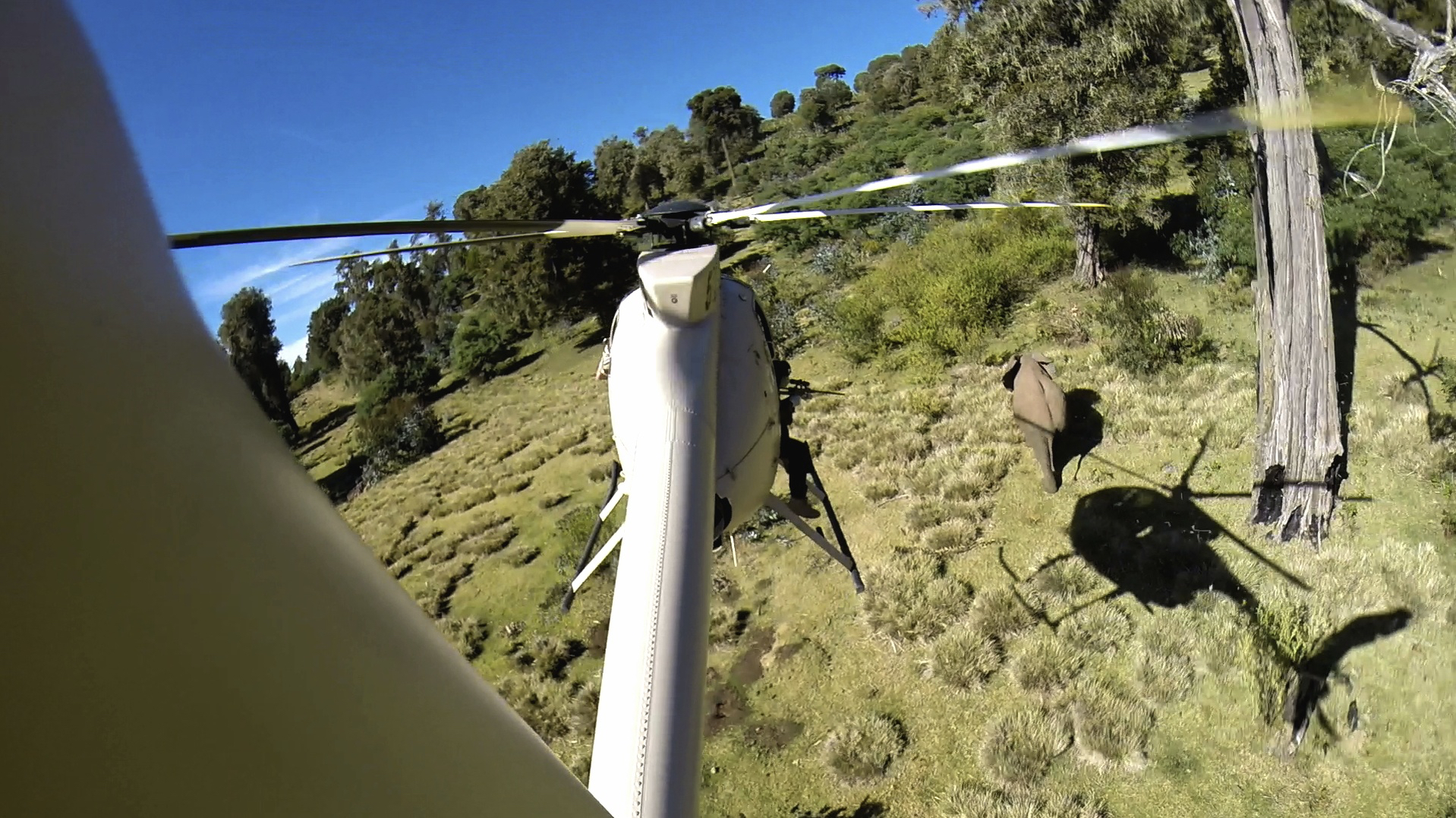Netflix’s The Ivory Game – Q&A with directors
By Tribute on November 4, 2016 | 2 Comments

A new Netflix documentary called The Ivory Game bravely takes aim at the ruthless practice of elephant poaching and the reprehensible trade of ivory. The Leonardo DiCaprio-produced film is deeply unsettling as it tracks the industry across eight countries and depicts the animals as a species under severe duress. But it’s a film that needs to be seen in order for the merciless murder of elephants to end.
Tribute’s Matthew Pariselli sat down with Kief Davidson and Richard Ladkani, directors of The Ivory Game, while they were in Toronto to screen the film at TIFF 2016. They discussed the inspiration for the film, the dangers and challenges they encountered while shooting it, how Leonardo became involved and what their attachment to the story may lead to next.
Your film was inspired by a New York Times article. What about the article prompted you to make The Ivory Game?
Richard: The name of the article was The Price of Ivory. The headline was, “Ten years to extinction on the African Elephant.” It was catchy, so reading that was basically like reading about a war unfolding against elephants. It was immediately clear that this was something that needed to be bigger than just an article. Even though it was in the New York Times, we felt that it was a topic the world should know more about. We got together and discussed what we could do. There were all these elements that would make a good movie. And if you can make a good movie, you can reach millions of people… It wasn’t as easy as just saying, “Let’s do this.” It was a super dangerous thing. We’re talking about people getting killed, elephants getting shot, all these traffickers, the mafia, syndicates… We asked ourselves, “Do we really want to get involved in this?” But after quite a few discussions, the decision was “Yes.”
What were some of the dangers you encountered while making the film?
Kief: Even when you go into dangerous situations, there are ways to mitigate risk. So we took every precaution necessary with our producers… We were also working with people whose covers we couldn’t blow. We obviously didn’t want to be exposed because we knew we’d be exposing them and they’re the ones whose lives are on the line. We worked on our first project together 12 years ago and we were a lot younger and dumber then. We were more into risk taking. But it was very different this time, now that we have families. Luckily we have very supportive wives… But again, you never know. Probably one of the most dangerous things was flying around. In most situations, there were only two-seat planes. And Richard was in one of them because he was filming. So there was probably more danger in flying around than anything else. Wouldn’t you agree?
Richard: Yeah, and landing in places where there’s no airstrip. Landing on a dirt gravel road somewhere in the bush where you never thought it was possible to land a plane. Or in a river bed, where you just go down and you’re like, “Holy sh*t!” And the pilot says, “We’re landing.” And you’re like, “Where?! There’s no place to land!”
Kief: It’s these types of things people don’t think about. Just travel is dangerous. Any time you’re going into that type of situation, it’s not always the most obvious things…
Richard: I should also add that my wife was the production manager of the film. We have two little children and it was great to work with her directly. Basically, she was able to understand why everything was going on. What we were doing, where, what the risks were. She was the one who kicked me in the butt and said, “You have to go out and do this.” I was hesitating. But she was like, “You have to do it. It’s too important not to. We’ll make sure you’re safe. Do it.”
Kief: One thing I found funny was talking to [Richard’s] dad. When we first started talking about this idea, his dad said, “Kief, make sure you keep Richard safe.” And I’m thinking, “How am I going to keep Richard safe?” (Laughs.)
Aside from the dangers, what were some of the biggest challenges that you overcame to get the film made?
Kief: I would say access was the first big challenge. It’s a massive topic with a lot of different people doing different things, people fighting on the frontlines and people in the field. Africa is a very big place, so first and foremost, it took time to figure out who the characters were going to be, what the stories were going to be and getting that access. That took a long time.
Richard: Tanzania, for example, took eight months. Eight months of continued meetings. I think we flew seven times to Tanzania to discuss with governments, police, all the intelligence services, why they should allow us to film their secret task force that has never been in public before… It took a lot of convincing for them to see that it was a good idea to show that they’re fighting evil and that they’re actually successful. Obviously they don’t trust media and I understand that. There’ve been plenty of films exploiting the bad sides of things. But we were looking for hopeful stories and positive stories. And the Tanzania task force was one of those hopeful ones. They had lost over 50 percent of their elephants in five years. But the task force had just come together to fight traffickers and poachers on a big scale and basically, we wanted that story to be out there and to be known. If you make a film that’s just about terrible tragedy — elephants dying, it’s so horrible, one carcass after the other — if you don’t present people who have a solution or are doing great things to stop it, then why make the film? It would be the most depressing film on the planet. We wanted to point people in the right direction, show them that there are amazing people and that these ones are the ones you should focus on.
Leonardo DiCaprio is one of the executive producers. How did you get him on board?
Kief: We tried to partner with people in general that would be advocates of the film. Leo was one, Jane Goodall was another. She’s an ambassador for the film. It was important to us to have people like Jane and Leo who could help amplify the press so people know about the film, so everyday people can take action. It’s not going to be one person that helps solve this issue. It’s going to be an army of people that help. We really need strong voices out there with the megaphone.
Richard: He got on board after just seeing a trailer. We had cut a few trailers during the making of the film to get interest and when we reached out to him almost a year ago now, he had seen the trailer and just said, “I’m in.” Basically, it felt like it was something he was looking for. We were looking for him as the number one person most involved with elephants. He has a very loud voice and he will be heard. It was cool to have him on board early. We kept feeding him rough cuts, fine cuts. He had some good ideas, we listened and now we have a film (laughs).
The subject matter is heavy, can be quite dark and as you said, depressing. How did you find joy in shooting the film?
Richard: The joy came in the inspiration people gave us. They empowered us to keep going. There wasn’t much beauty in this. Yes, the African landscape, the elephants and the animals you see, that’s just unbelievable. You can really take that in. But we only maybe had one or two or three days where we could just go out on a safari. We were waiting around, there was constant stress, we were trying to keep up with all these people, get information about what is going on, where we need to be next. We shot this in eight countries. So it was crazy, the logistics behind it. Monitoring the characters and always being in touch, understanding that, “Okay, you’re on this now. Do you think there will be an arrest? Will this happen? When are you going in? When will you meet an investigator? How?” It was constantly like that. There was almost no time off. But it was always amazing to see wild elephants and wild animals in their natural habitats, alive and well and great. We drew from that.
Kief: The inspiration comes from the characters and from some of the success that we’ve had. There’s still a long, long way to go, but due to their efforts, you can see that there could be a solution out there. There could be an end to the devastation. We hope that it’s inspiring to see what they’re doing to make that happen.
Is this topic something you’ll follow closely over the next few years? Would you consider doing a follow-up documentary?
Kief: We can only do so much with our film as the filmmakers. Ultimately, it’s putting the film in the hands of people that really know what they’re doing to help make change. There’s a whole group of people behind this film. Paul Allen’s company, Vulcan Productions, Terra Mater Studios. There’s an army of people, all the NGOs that we’re going to partner with to take the film and ideally use it to enact some sort of change. As to whether we’d move forward with something in the future, there’s certainly a series there. But we’d have to decide whether it’s something we want to continue with.
Richard: We’re thinking a fictional series could be interesting. Like CSI. With a documentary, you can only go so far. In the world of fiction, you can have that ship blow up. You can bust in, SWAT team-style. You can have bullets flying around. You can make it more fun and that would make it more appealing to an even wider audience than a documentary. There’s talk, there are ideas, but it’s too early right now.
At the end of the film, it’s said that China has yet to reveal a concrete timetable as far as banning the ivory trade. Is progress being made even if they haven’t disclosed that?
Kief: It’s hard to know what’s going on behind the scenes, but the word is that they’ll make an announcement by the end of the year. That’s just the word, who knows whether that’s legitimate. But regardless, it’s one thing to say you’re going to ban the ivory trade. It’s another thing to say when it’s going to happen and what steps will be put in place to make sure it’s done right. If they say it’ll take five years to phase it out, five years could result in half of the current elephant population being decimated. It’s important for them to not only enact a ban, but have it be as immediate as humanly possible.
Which filmmakers were you inspired by while making The Ivory Game? Were there any works you referenced?
Richard: We didn’t really see a film out there that resembled what we wanted to do, which also made it harder for us to find the trust from people, especially financiers. A film that had come out also on Netflix was Virunga, on gorillas and the fight to save them. That was in some regards similar in topic, but then again, we were going to be shooting in eight countries on three continents, so much bigger in scale. We didn’t have a reference. We wanted to create something that was perfect for this film and in a way, the style of the film was decided by what we found in the field. Basically, we found ourselves in a real life thriller. People were wearing bulletproof vests, SWAT teams were going in, there were undercover cameras, spy cam technology, thermal energy that they were using. All the things you see in the movies, they use them for real. Like spies, like agents. So we were like, “Okay, we’re going to shoot this as a thriller. Not because we want to, but because it is a thriller.” We also wanted to make sure the film was cinematic and beautiful to watch. We know the film’s a hard topic, but we wanted people to have at least a cinematic experience seeing it. Big visuals, aerials, cinematography. We used drones and we relied on beauty. We tried to put in beauty wherever we could. That’s what’s worth saving. The beauty of the wild and the elephants in the wild, just this amazing wilderness that should be preserved as is and not emptied and void and desolate.
You achieved that. Visually, it’s a stunning film. Ideally, where would you like to see the documentary go?
Kief: Our goal is to see the trade banned entirely. The ban will be the true mark of success. That’s the accomplishment. And it’s not just going to come from this film. I don’t want to give the impression that this film is what will do it. It will be the world’s collective fight against it. That’s the objective.
Richard: We want it to be out there by you guys. Media can help so much. We have to hit those drums as hard and loud as we can, so China hears us. And they’re far away (laughs).
Kief: The media also needs to portray this as an urgent point in history, but that there is hope out there and there are potential solutions out there. It’s important not to make this seem like an unattainable goal.
Richard: Or a terrible tragedy.
Kief: So terrible that people are like, “What can I do about it?” The reality is, there’s something everybody can do about it. In the U.S., there was a federal ban put in place, but there’s still no state-by-state ban. There are still only three or four states that have made it illegal. People can rise up. It’s important for the media to show that this is urgent, this is now, there are solutions out there. Obviously we can’t control what China’s going to decide to do, but if we lead by example, maybe they’ll follow.
Thank you and best of luck with the film!
The Ivory Game hits Netflix today — Nov. 4, 2016.

So tragic, but so great that this barbaric practice is being exposed. Bravo to the brave directors – I hope plenty of people check out the doc!
I adore elephants and think it is a disgrace that they are being hunted, they have more right to be here than we do they have been around for a long time. All they want is to be left alone to live in peace and they are not allowed to do that. Greedy evil excuse for humans are killing them for their ivory and soon they will be extinct. We need to do everything in our power to stop this.